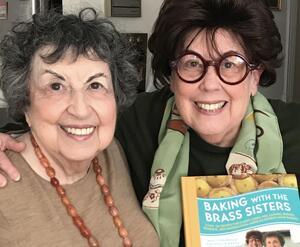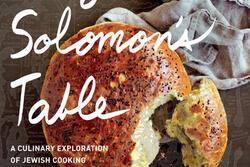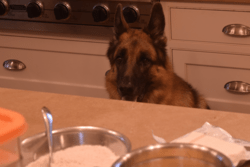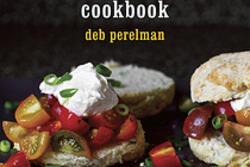Recipes for Life
I recently spent a delightful afternoon with two women who are brilliant, lively, curious, and open-minded. At 76 and 81, Marilynn and Sheila Brass, better known as The Brass Sisters, have a lot to say, to people of all ages, about the universality of coming together over food, the opening of doors between cultures, the necessity of listening and empathy, and the importance of stories. After decades of pursuing careers and caring for their parents, and united by their love of food and family, they published their first cookbook together at ages 60 and 65. Since then, this fierce duo has published three more cookbooks, and most recently, launched a PBS show, The Food Flirts, which showcases their sense of fun and appreciation for diverse food.
Chatting with Marilynn and Sheila, it struck me how often the words “nurture” and “nourish” came up in our conversation. The Brass Sisters certainly recognize the importance of nurturing others, through food, compassion, and acquired wisdom. I myself felt nourished—by the delicious cake they served me and by their warm, funny stories. Having missed out on having a Jewish bubbe, I want to adopt them as my own. Indeed, while they never had children, The Brass Sisters are honorary grandmothers—and culinary proprietors—to generations of people. The world is better off for the sweetness they serve up.
The following are morsels from our wide-ranging conversation.
How did you get started cooking?
It all came from our mother, who taught herself how to cook and bake when she married our father. She became a fabulous cook and a baker supreme. Our home centered around food and our mother’s cooking. Relatives and neighbors and people from our synagogue were in and out all the time, and no one ever went away hungry. Mama always served them cake—she was the original cake boss! She really was gifted.
As soon as we were just tall enough to reach the kitchen table, our mother started to teach us to bake and cook. She gave us our own child-size rolling pins and pie pans and some dough and let us “cook” alongside her. She taught us that when you go into the kitchen, you can be adventuresome and try new things. But we also learned from her that there’s nothing better than eating something that’s been cooked for you by someone you love. The corollary to that is there is nothing better than cooking something for someone you love.
How does your Jewish heritage influence you and your work?
We could write a book about what it was like growing up Jewish in the 1940s and 1950s! We have a lot of memories of Shabbes in our home. On Fridays, there would be chicken soup bubbling on the stove while the challah was rising. Our mother’s challah was light as a feather. We also remember every Friday polishing our grandmother’s candlesticks, which she had brought with her to America.
We didn’t have a lot of money, but we had a wonderful home and family. We feel like the richest people in the world. To us, being Jewish means you give, you comfort, you support.
You’re clearly devoted to each other and have a lifelong partnership. What makes it work?
Sheila: I loved her from the moment my parents introduced her to me as a baby! We brought each other up.
Marilynn: We start and finish each other’s sentences. It’s very rare for us to disagree. We pool our money, and we never go to bed angry.
Before you started writing cookbooks, you were antiques dealers. Tell us about your interest in collecting culinary utensils and cookbooks.
We get so much pleasure looking at these old things and knowing the history behind them. Every one of these objects and photos and books has a story. And we’re all storytellers—in the old days there was always the person who told stories and passed them down. We always say: do a gentle interrogation of the elders … and make sure to get their recipes! The recipes always come with a story.
What inspired you to do The Food Flirts?
This is such a divisive time; we want to celebrate diversity and multicultural influences in American cuisine. We call the show “food without borders.” Food is what brings us together. It doesn’t just nourish our bodies, it nourishes the soul.
What would you like to teach younger people through your show and books?
You’re never too old to experiment, expand your horizons. Don’t limit yourself! We still want to try new things. Our show is our “culinary bucket list” because we’re trying foods we’ve never had before, and then creating our own take on those foods.
But we also want younger people to realize that older people are viable and really smart. We have a lot to offer and teach, and we can give people hope. Life repeats itself and is cyclical, so it’s important to learn from the people who come before you. Everything old becomes new again.
For a taste of the Brass Sister’s dedication to making the old new again—and a taste of their delicious recipes—see Marilynn’s post about Grandma Goldberg’s Honey Cake.










Great article, it made me want to know more about the relationship of these sisters. How unique and loving. We so often express love through food as they do. I can't imagine how much love they have baked up over the years!